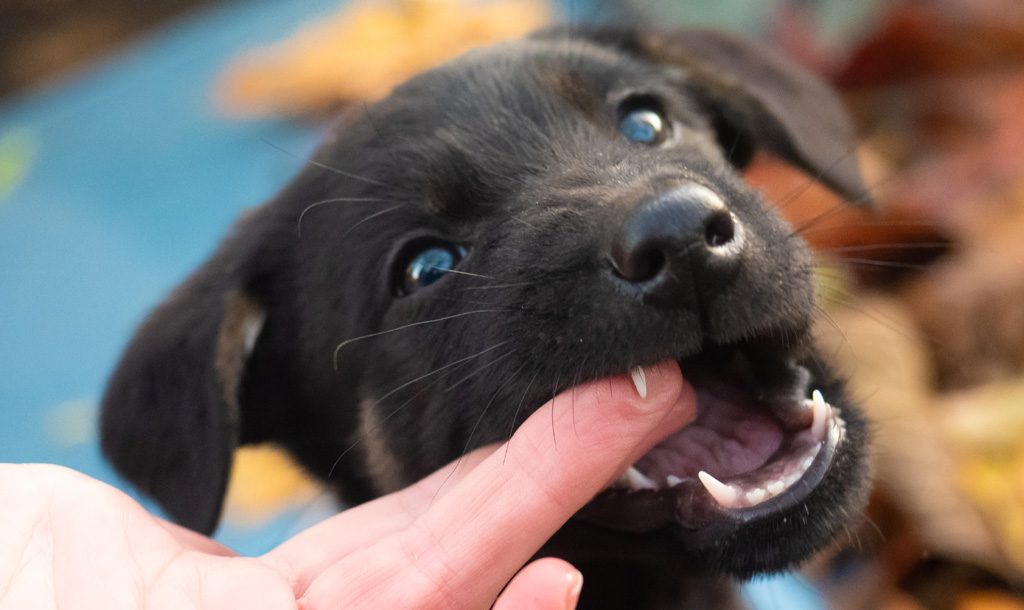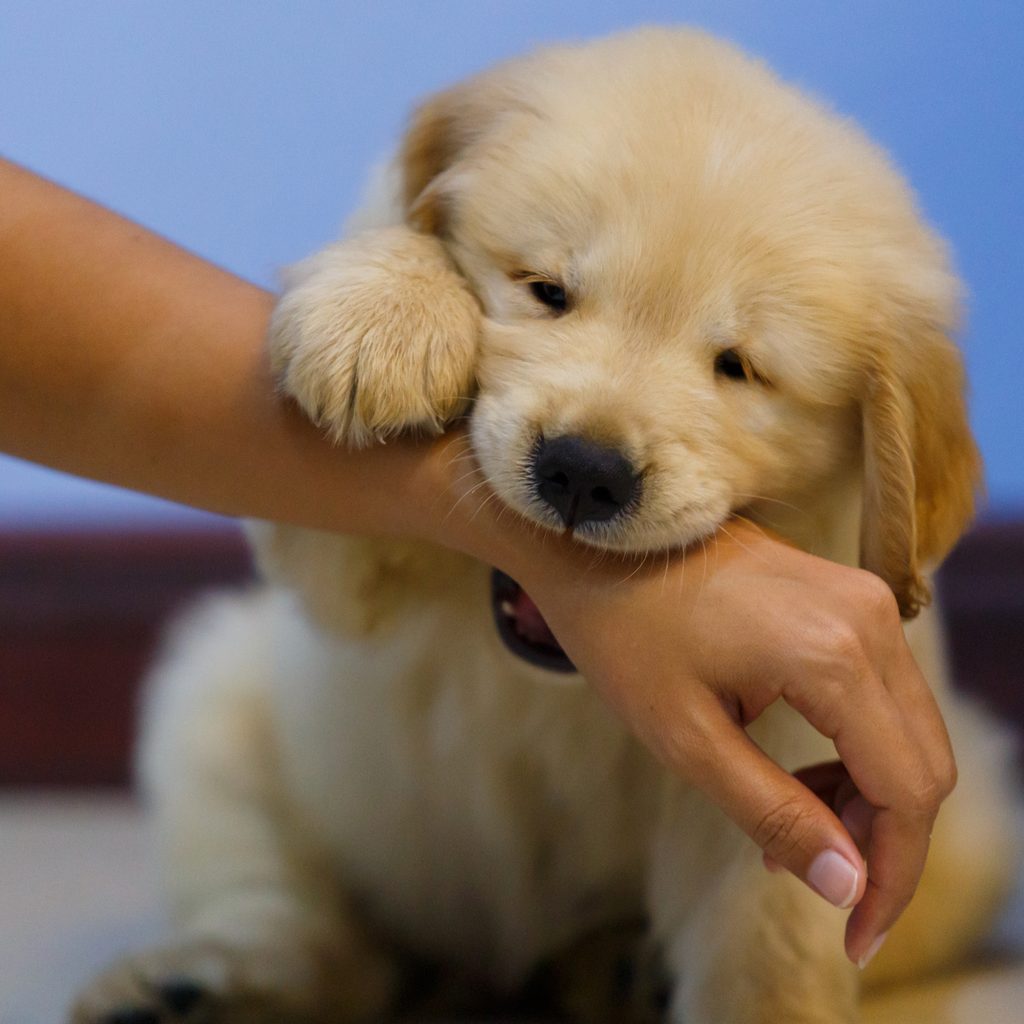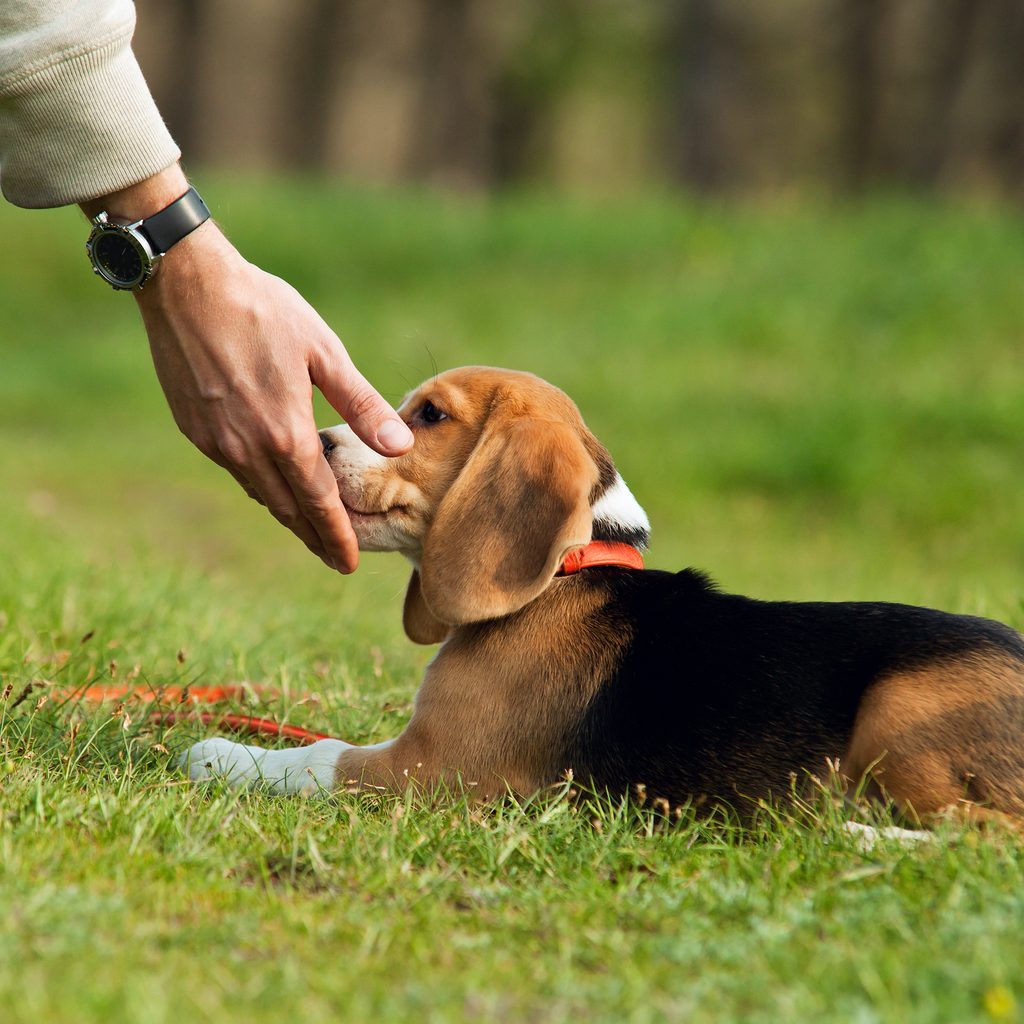Adding a new puppy to the family is always exciting, but with new dogs comes new training. Puppies need to learn how to do everything — from potty training to teaching dog commands, you’re responsible for your new pup.
It’s also up to you to ensure they don’t develop any bad habits. You might have noticed your puppy is a little excitable, nipping and mouthing at everything (and everyone) in sight. It’s no fun when those razor-sharp teeth sink into your skin. You weren’t expecting this, and now you’re worried that your puppy is showing aggressive tendencies. Want to learn how to stop puppy biting? This is a common issue, and more importantly, a normal part of puppy development. Here’s what you need to know.

Why do puppies bite?
- Puppies put their mouths on everything because it’s the only way they know how to interact with the world, according to Jennifer Summerfield, a member of the American Veterinary Society of Animal Behavior. If you’ve watched puppies playing together, you’ve noticed that they use their teeth a lot. For a puppy, it’s natural to grab hands, sleeves, or pant legs when they want to initiate playtime.
- Puppies typically start teething when they’re between 3 and 4 months old, and this process can last until the age of 6 to 7 months. You’ll likely see an increase in nipping and biting behavior as your puppy deals with the pain and discomfort associated with losing baby teeth and cutting adult teeth.

When do puppies stop biting?
According to Summerfield, most puppies are biting and mouthing much less by the time they’re 8 to 10 months old. But, of course, every dog is an individual, and some may stop sooner than others. Also, depending on the breed, managing nipping and mouthing might be a lifelong task. For example, golden retrievers are naturally mouthy, and herding dogs such as border collies or corgis might engage in ankle-nipping behavior into adulthood.
According to veterinarian Jerry Klein of the American Kennel Club (AKC), while play biting doesn’t mean your puppy is vicious, “if you haven’t been able to moderate the behavior by the time your puppy is 6 months old, it’s a good idea to consult an experienced dog trainer or animal behavior specialist.”

Redirect to positive behavior
Redirecting is the absolute best way to stop your puppy from unacceptable biting, nipping, or chewing, according to training experts. The key is to have a bunch of your dog’s favorite toys all around the house so that you can easily grab one when needed.
Summerfield recommends using a variety of toys to keep your pup’s attention. She suggests using long, floppy rope or fleece toys for tugging; plush squeaky toys for biting and carrying; and smaller toys or balls for chasing or fetching.
Step 1: You can discover which toys are your puppy’s favorites by tossing them or by wiggling them enticingly along the floor to see which ones get them the most excited. Have these toys for redirecting your dog from biting behavior.
Step 2: If you’re playing with your puppy and they bite your hand, grab one of their toys and use that to play with, says Summerfield.
Use an interrupter cue
If your puppy nips you, use an interrupter cue to stop the behavior. An interrupter cue is similar to the yelp of a littermate to let a puppy know when play biting hurts. Use this cue even when your puppy accidentally puts teeth on your skin, and they’ll learn that human skin is off limits where their teeth are concerned.
Step 1: When the pup nips you, say “eek” or “ouch,” which is meant to startle, not scare your dog.
Step 2: As soon as the puppy stops nipping and looks at you, reward them with a treat and give him a favorite toy.
Teach your puppy that biting means the fun ends
Step 1: If your puppy bites while playing, end the game immediately.
Step 2: You can ask them for a “sit” and then reward them with a treat for responding.
Step 3: If your puppy calms down, you can resume playing.
Step 4: If your puppy doesn’t calm down, gently take them to their crate or exercise pen for a time-out. Sometimes a biting puppy is really an overtired puppy, and they need to be put in a quiet space or crate to take a nap.
Step 5: Excessive play biting might also mean that your puppy needs to burn off some energy. Tossing a ball in the yard for them is a great way to do this.

Stay the course
Always keep things positive when working to get your puppy’s biting under control. The drive to bite and chew on things is deeply ingrained, and punishment won’t help your puppy to understand what they should do with their mouth, Summerfield says. Instead of getting angry when they bite consistently, redirect your puppy to appropriate behavior and reward them for doing the right thing. Not only will this help solve the biting problem, but it also will ensure that a strong and loving relationship develops between you and your dog.





